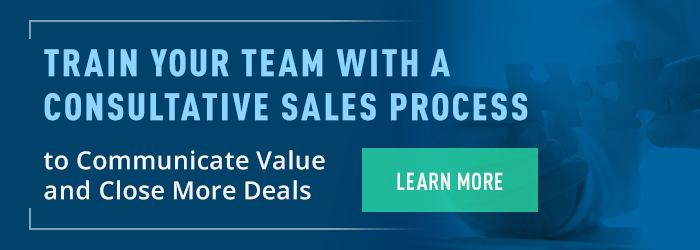Trust is an intangible measure of relationship with very tangible business results. It is often the differentiating factor in a sale and, once lost, it is very difficult to regain.
Be sure to coach your salespeople on the ways they can establish and maintain trust with buyers. Here are 6 steps they should follow throughout the sales process to do just that.
Step #1 Prepare for Every Interaction
Your salespeople should become accustomed to preparing ahead of time for every interaction they have with a prospect or customer. The initial interaction is the most critical, as a salesperson has only 19-34 seconds to make an impression.
Be sure your reps are doing research, creating pre-call plans, and preparing probing questions they plan to ask the buyer. The right questioning strategy will demonstrate to the buyer that the rep has taken the time to prepare and learn as much about their situation as possible.
It also signals to the buyer that the salesperson is committed to understanding their issue and consulting with them, rather than simply trying to push a product or service. Train your sales team with a consultative selling process to ensure they maintain a buyer focus and establish the trust that will lead to closed business and long-term partnerships.
Step #2: Build Immediate Rapport
It can be easy to forget that decision makers are people, and their decision to purchase an offering can be greatly influenced by the experience they have communicating with a salesperson.
It takes more than a “likeable” or “charismatic” salesperson to make a positive impression on a buyer. In today’s fast-paced selling environment your salespeople must be able to quickly identify a buyer’s behavior style, and adapt their approach to match.
For example, if a person has a high D behavior style (based on the DISC assessment) your salesperson should limit small talk, keep a fast pace, and communicate with bullet points and direct answers. If the buyer has a high I behavior style, on the other hand, your salesperson can lean into the friendly banter, provide personal stories to illustrate a point, and focus on the big picture.
The Confident Conversations training program will improve your sales team’s ability to communicate effectively with buyers and help them gain trust from the very first interaction.
Step #3: Ask Strategic Questions at Every Stage
Your sales team should be prepared to ask thoughtful probing questions during each stage of the sales process. The questions should change and probe deeper at each stage, demonstrating your team’s deep and growing knowledge, understanding, and curiosity about the prospect’s problems and needs.
Below are a few examples of strategic questions a salesperson might ask related to goals:
- How are you tracking to your goals?
- What factors have been disruptive to your goals?
- How will this further your mission and goals?
- What outcomes are you looking to achieve?
- What is your organization not doing that you would like them to do?
The Brooks Group’s IMPACT Selling training program teaches participants to ask 3-deep, probing questions to uncover a buyer’s wants and needs and recommend a solution that delivers the most value.
Another excellent resource for improving questioning skills is the book Power Questions by Andrew Sobel and Jerold Panas.
Step #4: Make Tailored Recommendations
When your salespeople have asked smart questions, they can then make tailored recommendations that offer the most value for the buyer’s unique situation.
The more clear and targeted the recommendations are, the more trust your prospects will have in the solution and your salesperson.
Your salespeople must communicate to a buyer they understand that their situation is unique, and that the solution they’ve recommended takes that into consideration. A tailored recommendation gains more trust than a boilerplate solution.
Step #5: Back Up Claims About Your Recommendation
During the Convince stage of the sales process, your salespeople must not only provide persuasive points on the value of your solution, but they must be able to back up their claims with evidence.
There’s no quicker way to lose the trust of a buyer than to make an unsubstantiated claim.
This proof can come in the form of client references, case studies, ROI calculators, or guarantees. This late-stage demonstration of value and standing behind your solution will go a long way toward helping the prospect to take the final step.
Step #6: Exercise Impeccable Integrity
An effective sales process is non-manipulative by nature. The goal of your salesperson should be to keep the focus on the buyer, and only recommend a solution that will help them move closer to reaching their stated goals.
Sometimes, your salesperson may consult with a buyer and determine that your offering is not the best solution—and that’s ok. Your team will win in the long run by only choosing to do business with buyers who are a good fit. (Learning to identify a qualified prospect up front can be helpful for this reason.)
The Bottom Line
Establishing trust early on with a buyer—and maintaining that trust throughout the entire client relationship—will lead to increased revenue through repeat business and referrals.
Train your sales team with a buyer-focused, consultative sales process like IMPACT Selling and enable them to establish the foundation for profitable, long-term relationships with buyers.
IMPACT teaches your team a consistent process for building long-term trust, while simultaneously working towards a timely close.
Create the Biggest Impact at Your Annual Sales Meeting
It’s not often that you’re able to get the whole sales team together in one place. Make the most of your annual sales meeting by keeping your salespeople engaged, and getting hyper-focused on the things that will improve your team’s performance the most.





